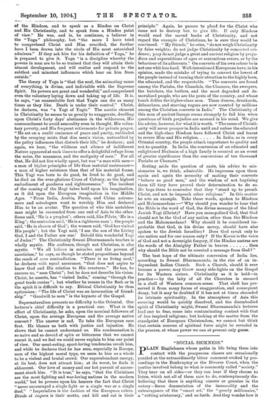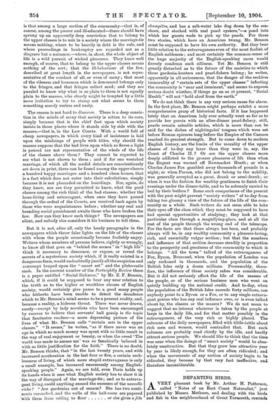"SOCIAL SICKNESS."
pLAIN Englishmen whose paths in life bring them into contact with the prosperous classes are occasionally puzzled at the extraordinarily bitter comment evoked by pro- ceedings in the Bankruptcy or the Divorce Court, when the parties involved belong to what is commonly called "society." They hear on all sides—or they can hear if they choose to listen, which not all of them care to do, contemptuously dis- believing that there is anything sincere or genuine in the outcry—fierce denunciation of the immorality and the extravagance of the "smart set," the "greedy millionaire," a "rotting aristocracy," and so forth. And they wonder how it
is that among a large section of the community—that is, of course, among the poorer and ill-educated—there should have sprung up an apparently deep conviction that to belong to the upper classes is to mix in a society where the marriage-tie means nothing, where to be heavily in debt is the rule, and 'where proceedings in bankruptcy are regarded not as a disgrace but a nuisance,—where, in short, the whole object of life is a wild pursuit of wicked pleasures. They know well enough, of course, that to belong to the upper classes means nothing of the sort ; that the ill-behaviour of the few, described at great length in the newspapers, is not repre- sentative of the conduct of all, or even of many ; that most of the vileness and looseness which is denounced belongs only ' to the fringes, and that fringes collect mud; and they are puzzled to know why what is so plain to them is not equally plain to the masses, who clearly might be tempted by a little more irritation to try to stamp out what seems to them something merely useless and nasty.
The reason is not hard to discover. There is a deep convic- tion in the minds of many that society is rotten to its core, simply because that is the chief fact upon which society insists in those places where it stands side by side with the masses,—that is, in the Law Courts. With a world full of cheap newspapers, in which every kind of insistence is laid upon the misdoings of people with titles, why should the masses suppose that the bad lives upon which so fierce a light is poured are not representative of the whole of the life of the classes above them ? They cannot be expected to see what is not shown to them ; and if for one wretched marriage, of which all the sordid details are conscientiously set down in print, there can be found among the upper classes a hundred happy marriages and a hundred clean homes, that is a fact which does not enter into their calculations, simply because it is not placarded on the hoardings. Nor, again, do they know, nor are they permitted to know, what the good classes among the rich think of the bad classes; whether the loose-living and extravagant, when once they have passed through the ordeal of the Courts, are received back again by those who were acquaintances before ; whether any real and branding social punishment awaits those who have broken the law. How can they know such things ? The newspapers are silent, and nobody else considers it his business to tell them.
But it is not, after all, only the heady paragraphs in the newspapers which throw false lights on the life of the classes with whom the people occasionally become foolishly angry. Writers whom numbers of persons believe, rightly or wrongly, to know all that goes on "behind the scenes" in "high life" think it necessary to denounce, or expose, or reveal the secrets of a mysterious society which, if it really existed in a dangerous form, would undoubtedly justify all the suspicion and contempt 'heaped upon the "smart set" and the plutocratic snob. In the current number of the Fortnightly Review there is a paper entitled "Social Sickness," by Mr. E. F. Benson, which, if it could be supposed to bear any near relation to the truth as to the higher or wealthier classes of English society, would certainly give pause to a good many people who hitherto have been unable to detect the decadence which to Mr. Benson's mind seems to be a present reality, and, because a reality, a hideous threat. There was never drawn, surely—except by lady novelists who have been encouraged by success to believe that servants' hall gossip is the topic that fascinates readers—a more depressing picture of the lives of what Mr. Benson calls "certain sets in the upper classes." "It seems," he writes, "as if there never was an age in which so much money was spent with so little result in the way of real enjoyment or beauty, or when the creed The world was made to amuse me' was so fanatically believed in with so little justification for the faith." There is no doubt, Mr. Benson thinks, that "in the last twenty years, and with increased acceleration in the last four or five, a certain reck- lessness of living, of which mere stupid extravagance is only a small example, has increased enormously among English- speaking people." Again, we are told, even Paris holds up its hands when it sees what English society has to show it in the way of disregard of the marriage-tie ; and as to extrava- gant living, could anything exceed the excesses of the nouvelle riche? "Are gardenias out of season ? She has two conti- nents ransacked, and the walls of the ball-room are papered
with them from ceiling to floor or she gives a fele champare, and has a salt-water lake dug down by the sea- shore, and stocked with real pearl oysters,"—a pond into which her guests wade to pick up the pearls. For these two stories, which have an American twang, Mr. Benson must be supposed to have his own authority. But they bear little relation to the extravagances even of the most foolish of English noblemen ; and most certainly the common-sense of the huge majority of the English-speaking races would fiercely condemn such silliness. Yet Mr. Benson is still greatly disturbed as to the future of the societies to which these gardenia-hunters and pearl-fishers belong ; he writes, apparently in all seriousness, that the danger of the reckless immorality of "certain sets of the upper classes" infecting the community is "near and imminent," and seems to express serious doubt whether, if things go on as at present, "Social Health" will not "hold aloof from the earth."
We do not think there is any very serious cause for alarm. In the first place, Mr. Benson might perhaps exhibit a more comprehensive grasp of historical facts. If it has happened lately that an American lady ever actually went so far as to provide her guests with an after-dinner pearl-fishery, still, pearls remain saleable articles, which is more than can be said for the dishes of nightingales' tongues which were set before Roman epicures long before the Empire of the Caesars reached its greatest strength. But to come down to modern English history, are the limits of the morality of the upper classes of to-day any laser than they were in, say, the Court of Charles II.? Or are the upper classes more deeply addicted to the grosser pleasures of life than when the Regent was warned off Newmarket Heath ; or when Charles James Fox gambled away thousands of pounds in a night; or when Porson, who did not belong to the nobility, was generally accepted as a guest, drunk or semi-drunk ; or when it was the fashion for wealthy gentlemen to finish their evenings under the dinner-table, and to be solemnly carried to bed by their butlers ? Some such comparisons of the present with the past might prevent "society writers" of to-day from taking too gloomy a view of the future of the life of the com- munity as a whole. Such writers do not seem able to take their eyes off the class which they must be supposed to have had special opportunities of studying ; they look at that particular class through a magnifying-glass, and at all the rest of the people through the wrong end of the telescope. For the facts are that there always has been, and probably always will be, in any wealthy community a pleasure-loving, rich, and essentially vulgar section ; but that the numbers and influence of that section decrease steadily in proportion to the prosperity and greatness of the community to which it belongs. "All the town" talked of the extravagances of Fox, Byron, Brummel, when the population of London was only reckoned in thousands, and the population of the British Isles only a dozen millions. Presumably, there- fore, the influence of these society rakes was considerable. But it did not seriously affect the life of the masses of the people, or of the serious business men who went on quietly building up the national credit. And to-day, when the population of the British Isles exceeds forty millions, can anybody point to a Byron or a Fox, or to any single extrava- gant genius who has any real influence over, or is even talked about by, the classes or the masses ? We do not mean to suggest that no interest whatever is taken by the people at large in the daily life, and for that matter possibly in the extravagances, of the very rich or highly placed. The columns of the daily newspapers, filled with tittle-tattle about rich men and women, would contradict that. But such columns are probably read chiefly by the idle, and hardly attract serious people. We should like to think that the time was near when the doings of "smart society" would be abso- lutely unattractive. But that they grow less attractive year by year is likely enough, for they are often ridiculed ; and when the movements of any section of society begin to be ridiculed, they become by that very fact ineffective, and therefore inconsiderable.



































 Previous page
Previous page